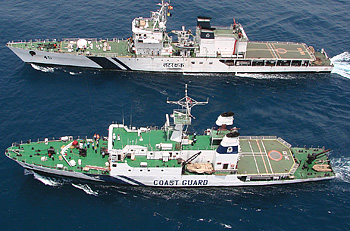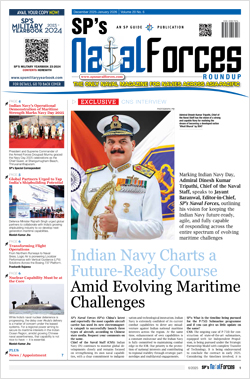INDIAN ARMED FORCES CHIEFS ON OUR RELENTLESS AND FOCUSED PUBLISHING EFFORTS

The insightful articles, inspiring narrations and analytical perspectives presented by the Editorial Team, establish an alluring connect with the reader. My compliments and best wishes to SP Guide Publications.

"Over the past 60 years, the growth of SP Guide Publications has mirrored the rising stature of Indian Navy. Its well-researched and informative magazines on Defence and Aerospace sector have served to shape an educated opinion of our military personnel, policy makers and the public alike. I wish SP's Publication team continued success, fair winds and following seas in all future endeavour!"

Since, its inception in 1964, SP Guide Publications has consistently demonstrated commitment to high-quality journalism in the aerospace and defence sectors, earning a well-deserved reputation as Asia's largest media house in this domain. I wish SP Guide Publications continued success in its pursuit of excellence.
- Global Partners Urged to Tap India's Shipbuilding Potential: Rajnath Singh at Samudra Utkarsh
- All about HAMMER Smart Precision Guided Weapon in India — “BEL-Safran Collaboration”
- India, Germany deepen defence ties as High Defence Committee charts ambitious plan
- G20 Summit: A Sign of Global Fracture
- True strategic autonomy will come only when our code is as indigenous as our hardware: Rajnath Singh
- India–Israel Joint Working Group Meeting on defence cooperation to boost technology sharing and co-development
Coast Guard
Force to Reckon With

Sea route used by terrorists for 26/11 Mumbai attack exposed vulnerability of India’s coastline and the pressing need for a coordinated approach to maritime security
The Indian Coast Guard (ICG) has come a long way as an armed force of the Union, under the Ministry of defence. raised in 1977, it is responsible for protecting maritime and other national interests in the maritime zones. since its inception, the ICG has grown to become a force to reckon with, executing its mandated charter at home and building up international liaisons.
Our neighbours look upon the ICG for assistance in the field of search and rescue, marine pollution response and anti-piracy issues. such requirements entail a greater involvement by the Coast Guard thanks to its expertise in these fields.
The ICG is also fully integrated with all the national agencies and organisations that are stakeholders in issues and challenges emanating from the sea. It is poised to expand exponentially in the next few years.
As entailed by legislation it performs its duties and functions besides supporting other ministries. In pursuance of its responsibilities, the director General, ICG, has also been designated as head of organisations such as the National Maritime search and rescue Board, etc and also as the Indian Governor for regional Cooperation Agreement on Combating piracy and Armed robbery against ships in Asia.
After-effects of 26/11
The use of the sea route by terrorists in 2008 highlighted the vulnerability of India’s coastline and the pressing need for a coordinated approach to maritime security by all the stakeholders and users of the sea. In February 2009, the government vested the ICG with the additional responsibility for coastal security in territorial waters and coordination between all central and state agencies.
As a result there has been increased focus on enhancing awareness of the maritime domain and patrolling in territorial waters by all concerned agencies. The following issues have been addressed on a war-footing:
- Coastal surveillance network with radar, electro-optic sensors, marine small target tracker, metrological sensors, VHF sets and automatic identification system (AIS) feed from national AIs chain to be implemented.
- Promulgation of standard operating procedures for coastal security for all Coastal states/Union Territories (UTs).
- Deputing ICG personnel for manning of joint operation centres.
- Functioning of coastal police stations in ‘hub and spoke’ concept with ICG stations for information outflow.
- Recommendations for fitment of transponders for fishing vessels and other craft less than 20 metres.
- Joint Indian Navy-ICG team identifying suitable radio-frequency identification for installation on fishing boats.
- Conduct of 36 coastal security exercises and 28 coastal security operations to validate coastal security mechanism.
- Conduct of ab-initio training of marine police.
- Community Interaction programmes to interact regularly with the coastal fishing populace with a view to sensitise them and act as ‘eyes and ears’ for any illegal activities.





